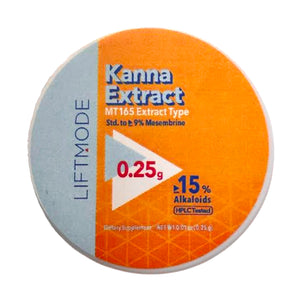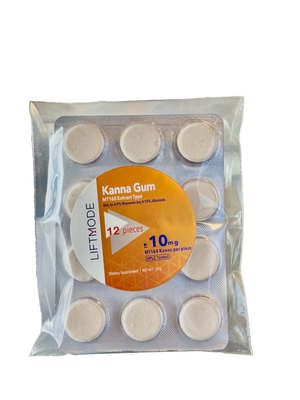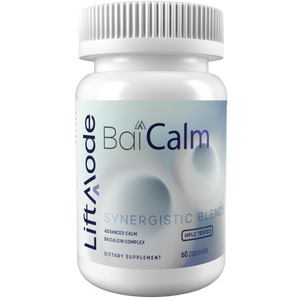"L-Tryptophan is an amino acid found in many food sources that are rich in protein. It is also found in high concentrations in bananas. L-Tryptophan is one of a few amino acids that are physiologically active at higher doses. At doses higher than you’d normally get from food, L-Tryptophan is really great for improving your mood and helping to maintain healthy sleep.
In this article, we’ll explore how you can use L-Tryptophan to improve your sleep. Many people wonder about how to take L-Tryptophan for sleep – what dosage to use and when to take it. This article answers these questions. We'll also solve the myth of using bananas to fall asleep.
![]()
What is L-Tryptophan?
When you take L-Tryptophan, the dietary supplement is converted into serotonin - a neurotransmitter responsible for regulating mood. Actually, a number of medical treatments for depression and anxiety prevent your brain from depleting stores of serotonin, which directly improves your mood. So, quite simply, more serotonin corresponds to a better mood.
[1]
L-Tryptophan also helps to regulate healthy sleep. Once your body has converted the L-Tryptophan into serotonin, it can make a new neurotransmitter called
melatonin. This process occurs in the light-sensitive pineal gland, located deep inside your brain. Melatonin has a number of uses but is best known for its ability to help bring about healthy sleep and regulate sleeping patterns.
[2]
How much L-Tryptophan to take for sleep
Your body must convert L-Tryptophan into serotonin before it can make melatonin and improve your sleep.
[3] This means that your body uses most of the L-Tryptophan to improve your mood. However, at higher doses, the excess serotonin will start to be converted into melatonin. So, a slightly larger dose of L-Tryptophan may be better for improving sleep.
[4]
[caption id=""attachment_1315"" align=""alignright"" width=""300""]
![]()
L-tryptophan may help to maintain healthy sleep[/caption]
However, one important thing to consider is that L-Tryptophan can be converted into serotonin in your liver. L-Tryptophan has to cross the blood-brain barrier to deliver its mood-boosting effects. If you take too much L-Tryptophan at one time, it may not all be able to cross the barrier, and will be converted to serotonin in your liver. This can cause unwanted side effects like an upset stomach.
[5]
The best way to take L-Tryptophan for sleep is to use a regular dose of around 4-5 grams daily, divided into 3-4 separate servings throughout the day. The recommended dosage for an L-Tryptophan supplement is around 3-5 grams per day.
[6] Taking 3 grams is more than enough to boost your mood, but if you really want to use L-Tryptophan to potentially improve your sleep, you may want to try using a higher dose.
How much L-Tryptophan is in bananas?
[caption id=""attachment_1297"" align=""alignright"" width=""290""]
![]()
Liftmode's L-tryptophan, 98+% purity[/caption]
Bananas are great in a number of ways! And they’re not only useful for the world’s strongest animal, the Silverback gorilla. Bananas are surprisingly high in L-Tryptophan. The problem is that bananas are relatively small and even though they have a high L-Tryptophan concentration, you need to eat LOTS of bananas to experience the effects of L-Tryptophan. According to the USDA National Nutrient Database, one banana contains around 0.011 grams of L-Tryptophan.
[7]
So, you’d need to eat at least 10 bananas per day to exceed 1 gram of L-Tryptophan. However, bananas are still a great food – high in magnesium and potassium, two very important minerals for optimum health.
[8]
Conclusion
In conclusion, L-Tryptophan is an important amino acid that is used to build proteins and is converted into a number of active compounds in your body. L-Tryptophan is found in protein-rich foods and also in bananas – but you’d need to eat loads of bananas to feel the great effects!
The best way to take L-Tryptophan for sleep is to use a dosage of around 4-5grams, spread out over separate servings throughout the day. This prevents negative effects of a single large dose but may help to improve your melatonin levels, and give you a more fulfilling night’s sleep.
Medical Disclaimer
Not intended to treat, diagnose, or cure any disease or ailment. Please read and fully understand potential adverse effects before using this product. These statements have not been reviewed by the FDA and are not written by a medical professional. Please consult your doctor before using any supplements, especially if you have any medical conditions. Tristan
B.Sc. in Molecular Biology and Biochemistry Researched & written by
Tristan and verified by the Liftmode.com Research Team
References:
[1] The role of serotonin in human mood and social interaction. Insight from altered tryptophan levels, SN Young, M Leyton, Pharmacol Biochem Behav. 2002 Apr;71(4):857-65.
[2] Human pineal physiology and functional significance of melatonin, MM Macchi, JN Bruce, Front Neuroendocrinol. 2004 Sep-Dec;25(3-4):177-95.
[3] Melatonin Biosynthesis: The Structure of Serotonin N-Acetyltransferase at 2.5 Å Resolution Suggests a Catalytic Mechanism, AB Hickman et al., Molecular Cell, Volume 3, Issue 1, January 1999, Pages 23–32
[4] Evaluation of L-tryptophan for treatment of insomnia: a review, Schneider-Helmert D, Spinweber CL, Psychopharmacology (Berl). 1986;89(1):1-7.
[5] L-Tryptophan overview, WebMD.com, retrieved on 18 October 2016
[6] Effects and side effects associated with the non-nutritional use of tryptophan by humans, JD Fernstrom, J Nutr. 2012 Dec;142(12):2236S-2244S. doi: 10.3945/jn.111.157065. Epub 2012 Oct 17
[7] Tryptophan in Bananas & Insomnia, by A MILLER Last Updated: Jul 02, 2015, Livestrong.com, retrieved on 18 October 2016
[8] Bananas, World’s Healthiest Foods, whfoods.com, retrieved on 18 October 2016"




